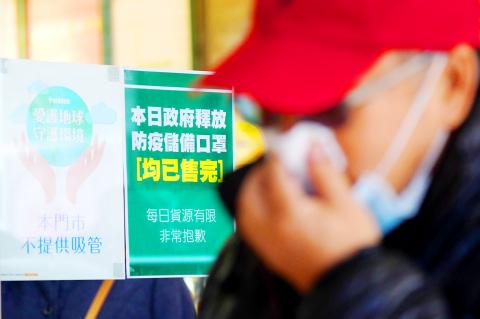Most people do not need to rely on surgical masks to prevent contracting 2019 novel coronavirus (2019-nCoV), Vice President Chen Chien-jen (陳建仁) said on Thursday, after reports that convenience stores had run out.
Chen, who is an epidemiologist by training, said that people with no symptoms of upper respiratory infection and fever can decide about wearing a mask depending on how likely they are to be exposed to the virus.
In Taiwan, potential exposure is most likely in three scenarios, he said.

Photo: CNA
First is from exposure to people who have tested positive for the virus, Chen said.
However, they have been placed in isolation, so they do not pose a public risk, he said.
Second, the virus can be passed on by those who have contracted it, but have not begun to display symptoms, he said.
Most commonly, these are people who have been in close contact with confirmed 2019-nCoV patients, such as family members and colleagues, or people who have returned from China’s Hubei Province, the epicenter of the outbreak, he said.
This group is subject to digital monitoring and compulsory home confinement for 14 days, which means the chance of being infected by them is low, Chen said.
Third, the virus can be transmitted via droplets from an infected person’s respiratory tract, he said.
However, it is unlikely for people to become infected if places that infected people have been are disinfected, he said.
People can be divided into nine groups according to how likely they are to come into contact with the virus, which guides whether a mask is necessary, Chen said.
Medical professionals are the first group and they are the most likely to be exposed to the virus, he said.
The second group is family members of people with 2019-nCoV, and the third, those who have been in frequent contact with an infected person, such as close friends and colleagues, he said.
The fourth group is public transport workers; the fifth is employees of enclosed entertainment venues; the sixth is people who have visited a hospital; the seventh people who use public transport, the eighth is customers at enclosed entertainment venues; and the ninth any who do not fit in the first eight categories, Chen said.
The list is intended to prevent undue panic and to allow masks to be used more efficiently, he said.
For the average healthy person, masks are not necessary to prevent 2019-nCoV infection, while the likelihood of contracting the disease remains relatively low, he said.

Chinese spouse and influencer Guan Guan’s (關關) residency permit has been revoked for repeatedly posting pro-China videos that threaten national security, the National Immigration Agency confirmed today. Guan Guan has said many controversial statements in her videos posted to Douyin (抖音), including “the red flag will soon be painted all over Taiwan” and “Taiwan is an inseparable part of China,” and expressing hope for expedited reunification. The agency last year received multiple reports alleging that Guan Guan had advocated for armed reunification. After verifying the reports, the agency last month issued a notice requiring her to appear and explain her actions. Guan

GIVE AND TAKE: Blood demand continues to rise each year, while fewer young donors are available due to the nation’s falling birthrate, a doctor said Blood donors can redeem points earned from donations to obtain limited edition Formosan black bear travel mugs, the Kaohsiung Blood Center said yesterday, as it announced a goal of stocking 20,000 units of blood prior to the Lunar New Year. The last month of the lunar year is National Blood Donation Month, when local centers seek to stockpile blood for use during the Lunar New Year holiday. The blood demand in southern Taiwan — including Tainan and Kaohsiung, as well as Chiayi, Pingtung, Penghu and Taitung counties — is about 2,000 units per day, the center said. The donation campaign aims to boost

The Kaohsiung Tourism Bureau audited six hotels in an effort to prevent price gouging ahead of Korean band BTS’ concert tour in the city scheduled for Nov. 19, 21 and 22 this year. The bureau on Friday said that the audits — conducted in response to allegations of unfair pricing posted on social media — found no wrongdoing. These establishments included the local branches of Chateau de Chine, Hotel Nikko, My Humble House, and Grand Hai Lai, it said, adding that the Consumer Protection Commission would have penalized price gougers had the accusations been substantiated. The bureau said the Tourism Development Act

BACK TO WINTER: A strong continental cold air mass would move south on Tuesday next week, bringing colder temperatures to northern and central Taiwan A tropical depression east of the Philippines could soon be upgraded to be the first tropical storm of this year, the Central Weather Administration (CWA) said yesterday, adding that the next cold air mass is forecast to arrive on Monday next week. CWA forecaster Cheng Jie-ren (鄭傑仁) said the first tropical depression of this year is over waters east of the Philippines, about 1,867km southeast of Oluanpi (鵝鑾鼻), and could strengthen into Tropical Storm Nokaen by early today. The system is moving slowly from northwest to north, and is expected to remain east of the Philippines with little chance of affecting Taiwan,